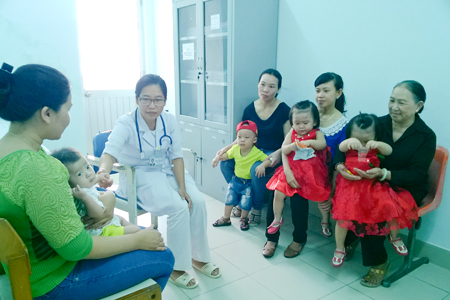
After 2 years of the implementation, the project on early monitoring and intervention for babies at high-risk of disability...
After 2 years of the implementation, the project on early monitoring and intervention for babies at high-risk of disability funded by L'APPEL, a non-profit humanitarian organization based in France has brought many kids with congenital anomalies to normal life with hope for a bright future.
 |
| Advisory session for babies under the project on early monitoring and intervention for babies at high-risk of disability at the Pediatrics Department, Khanh Hoa General Hospital. |
“My twin babies, born prematurely at just 33 weeks, were at risk of disability. Each baby was just 1.5kg, so they were kept in incubators. I was so worried. My family was were then provided counseling by pediatrics physicians, Khanh Hoa General Hospital about the monitoring and intervention for children at risk of congenital anomalies. One child was then detected with birth defects. After 2 years of treatment and physiotherapy, the child has recovered and developed normally,” says T.N.K.D, Ninh Ha Ward, Ninh Hoa Town.
“My premature baby, just 28 weeks, 1.2kg, was kept in a incubator. He was put under the monitoring and intervention for congenital anomalies and detected to have serious health problems, including a retina disease. We have strictly followed the therapy. He is 20 months old now and he has completely recovered. We are so happy,” says N.T.T.L, a mother in Cam Lam District.
The two patients are among 169 babies under the project on early screening for disability funded by L'APPEL at the Pediatrics Department, Khanh Hoa General Hospital since April 2016. The project has supported training in screening, monitoring and intervention for congenital anomalies; and partly funded needy patients. Beneficiaries have included premature babies, under 33 weeks, weighing under 1.5kg, kids with impairment, neonatal diseases, birth asphyxia, jaundice, brain abnormalities, etc.
Participating in the project, newborn babies are regularly examined, monitored and immediately treated when congenital anomalies are detected. After nearly 2 years of implementation, 169 children have been regularly monitored and followed prescriptions. Early intervention is more likely to be successful than later treatment. 58/169 babies have been detected to have congenital anomalies. 34 have been successfully intervened and others are undergoing treatment. 19 newborn babies founded with eyes problems, mainly with retinas. 16 of them have completely recovered and the other 3 are continuing with the treatment.
Early monitoring and intervention for impairment will help reduce babies with disabilities. Congenital anomalies can be treated through early detection and intervention. Screening medical examination is performed at the Pediatrics Department, Khanh Hoa General Hospital every Monday afternoon, says Tran Thi Lan Anh, the Pediatrics Department, Khanh Hoa General Hospital.
Before the project, the department had developed a program on screening for congenital anomalies. The project on early monitoring and intervention for babies at high-risk of disability has sponsored the human resource training at Khanh Hoa General Hospital. The department is capable of continuing the work when the project ends, according to Pham Enga, Chief of the Pediatrics Department, Khanh Hoa General Hospital.
Duy Anh Thu
Translated by N.T










